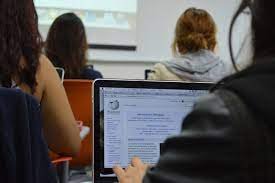Wonderful Wikipedia: all teachers hate, but it's great!
By Rex Lau
A student using Wikipedia on their laptop for research.
School assignments, lab reports, and essays. What do they all have in common? A need for research. Now, when you search for a general topic, like a country, sport, or music, what's the first website on Google? Wikipedia. I use Wikipedia all the time, and others do too! According to a survey sent to thirty Year-11 RCHK students, 93% of respondents said they often use Wikipedia for research. A worldwide study in 2021 showed nearly forty-three million active Wikipedia users. Despite this, schools dislike the use of Wikipedia. They despise it. They neglect it. They hate it. Teachers believe in one thing and one thing only: Wikipedia is wrong.
We will stop this unjust hate; everyone will acknowledge Wikipedia, and here is why.
Wikipedia, a free Internet-based encyclopaedia started in 2001, operates under no central organisation that controls editing rights. This freedom was where the first concern of this encyclopaedia was born. You, me, or anyone in the world was able to edit articles; it could lead to false information.
However, studies from 2005 to 2007 showed that 1% of editors wrote 77% of all Wikipedia articles. They're a group of highly qualified and dedicated writers, but how're we sure there aren't any individuals sabotaging Wikipedia within the 1%?
Wikipedia administrators suspend offending accounts that often vandalise articles. The online community of Wikipedia also ensures trustworthy citations support changes. Besides, if a specific page is frequently a target of vandalism, administrators will prevent the piece from being directly editable, only allowing highly credible Wikipedia veterans to edit. Wikipedia pages are also constantly monitored and fact-checked by thousands of talented writers before publishing.
The search bar of Google Chrome, with the “en” text boxed in red.
Several experts contend that the most trustworthy source of information comes from a well-known Wikipedia article, such as Amy Bruckman, a Georgia Institute of Technology professor.
Well, then, how do I know if the data is reliable? What if the thousands of people were ALL wrong? Have you noticed besides a lot of statistics, there's a bracketed superscript number? That's a Footnote marker, which allows you to find the source of a statistic by pressing it and redirecting you to the bottom of the article, displaying the correlating website. If you don't trust the piece, you can find the source and determine its trustworthiness. To avoid getting caught using Wikipedia, I copy the statistics from Wikipedia but cite the footnote marker website! The statistics are identical, but teachers now think it's accurate; it's genius!
Furthermore, as Wikipedia is a non-profit organisation, the articles are for YOUR benefit and nobody else's. For example, they even link other websites and publications within their articles if you want to inquire further.
Another benefit of Wikipedia is its accommodation for a wide range of individuals. But how? We've all opened a Wikipedia page and were suffocated by tons of information we don't understand. Did you know there's a Wikipedia hack that dramatically simplifies the information?
The top bar of any Wikipedia article, with the “Talk” and “View history” buttons boxed in red.
By replacing the "en" on the link address on your search bar with "simple", you turn the once unmanageable complex mess into short, digestible phrases that don't require people with PhDs to understand. The information isn't altered in any way, shape or form; it retains the detail but utilises synonyms for complex terms.
"I learned about Simple Wikipedia through TikTok, and it's now one of my go-to sources! I'm able to digest the basics of any complex topic easily," said Warren Suen, a Year-11 student. "It's much more understandable than a fifty-page research paper on quantum mechanics, and it's just as reliable! As long as it's a popular topic and not like the RCHK Wiki page."
This quote brings up the main reason for Wikipedia's controversy; less popular articles are less reliable, not in the spotlight of Wikipedia administrators, and susceptible to edits by anybody. An example would be the RCHK Wikipedia article, which has been vandalised countless times.
Most of the time, these false changes are reverted shortly, but this shows that articles of less popularity can easily be manipulated by anybody, leading to data inaccuracy.
The reasoning behind this concern is that we weren't taught how to discern fact from fraud on Wikipedia, which is something schools really should be teaching.
By simply clicking on the "history" button at the top of each article, you can view all previous modifications of that particular article. Another page labelled "talk" includes a record of any disagreement between editors regarding the article's content. All this can help students determine the reliability of the articles.
Overall, Wikipedia exists for a good cause, as a widely accessible and free encyclopaedia for anyone to explore whatever topic they desire. Every article editor puts in significant effort and does this solely out of the kindness of their heart, not getting paid a single penny! How could you hate these selfless, kind, and considerate people? It doesn't deserve the criticism teachers radiate.
Let us all revolt against the stereotypical belief that Wikipedia only contains false information. I know you've used Wikipedia before, so stop idly watching and let us correct this misconception once and for all for the greater good of Wikipedia.


